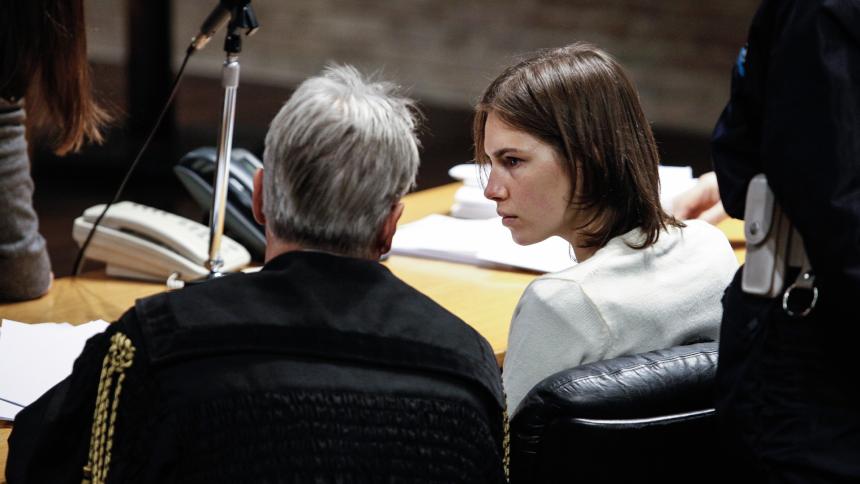
How Amanda Knox was unfairly convicted for Meredith Kercher's murder
More than 15 years have passed since British exchange student Meredith Kercher was murdered in her bedroom in Perugia, Italy. While Italy is no stranger to homicides and has seen its fair share of serial killers over the decades, this case stood out. It sparked a worldwide media frenzy that thrust Amanda Knox, Meredith’s American roommate, into the spotlight. Raffaele Sollecito, Amanda’s Italian boyfriend, was also caught up in the turmoil as both were accused and convicted of murder.
The crime that made global headlines
Described as ‘sociable and loving’ by her friends and family, Meredith was living in Perugia while on exchange from the University of Leeds. On 1st November 2007, she was found dead in her flat. The forensic report revealed multiple injuries, including bruises and cuts consistent with a hand being clamped over her mouth. Injuries to the genital region were also noted.
Amanda Knox and Raffaele Sollecito
Meredith shared a flat with three other people – two Italian women and 20-year-old Amanda Knox, an American student from the University of Washington. The latter was pursued by Italian police as the prime suspect.
Amanda was dating Raffaele Sollecito, an Italian native, at the time. On 6th November, the pair were both arrested for Meredith’s murder. Italian police, along with international media outlets, wasted no time presenting Amanda as a cold-blooded killer and Raffaele as her accomplice.
The role of Rudy Guede
The case developed further when the fingerprints and DNA of Rudy Guede, an Ivorian migrant living in Perugia, were found at the crime scene. Despite strong evidence suggesting Guede was the culprit, the police continued to pursue Amanda and Raffaele.
A trial by media
The courtroom wasn’t the only place Amanda Knox was put on trial. She was slaughtered by the press and given cruel nicknames like ‘Foxy Knoxy’. Local prosecutor Giuliano Mignini fed journalists a narrative that portrayed Amanda as promiscuous and manipulative.
Raffaele was presented as a lovesick puppy dragged into Amanda’s web. Meredith, who was remembered as kind, friendly and well-liked by those who knew her, was given a wholesome image. Ultimately, this narrative leaked into the courtroom and made it difficult for Amanda and Raffaele to receive a fair trial.
A flawed case
The trial of Amanda and Raffaele began on 16th January 2009. It was clear from the start that the prosecution’s case was flimsy at best. They relied heavily on character assassination, public opinion and circumstantial evidence.
One of the most damning pieces of ‘evidence’ was a supposed confession from Amanda where she told Italian police she was in the apartment when Meredith was murdered. In a later interview on the American news program Nightline, she explained she was coerced into saying this during a gruelling 53-hour interrogation without a lawyer present.
‘I was hit on the back of the head, I was yelled at. Police were coming in and out of the room telling me that I was a liar,’ recalls Amanda. ‘It was chaos. It was utter chaos.’
Despite the patchy evidence, Amanda and Raffaele were found guilty of murdering Meredith Kercher. Amanda was sentenced to 26 years and Raffaele received 25 years.
The long road to justice
Understandably, Amanda and Raffaele didn’t accept the verdict. After a lengthy appeals process, both were acquitted and released from prison on the grounds of a flawed trial. But their ordeal was far from over.
In 2013, the acquittal was overturned, and the Italian justice system insisted on a retrial. Amanda and Raffaele were thrown back into the spotlight and convicted for a second time in 2014. Once again, the pair appealed. In 2015, Italy’s Supreme Court acquitted both and ruled that no further trial should be held.
The aftermath
The final acquittal was an enormous relief for Amanda Knox, but it didn’t stop the media harassment. The tabloids continued to hound her, even after she returned to the USA. She’s since written a memoir titled Waiting to Be Heard, where she details her experience with the Italian justice system. Amanda has also become an advocate for wrongful convictions and prison reform.
‘I am never going to be free of having had to go through that experience,’ says Amanda.
Reflections on the case
The wrongful conviction of Amanda and Raffaele uprooted their lives and caused immeasurable stress and trauma. While their exoneration is a step towards justice, the case highlights the importance of fairness, due process and the human cost of sensationalist journalism.
Guede was tried separately in 2008 and found guilty of murdering and sexually assaulting Meredith. He was sentenced to 30 years in prison but was released after serving 13.









